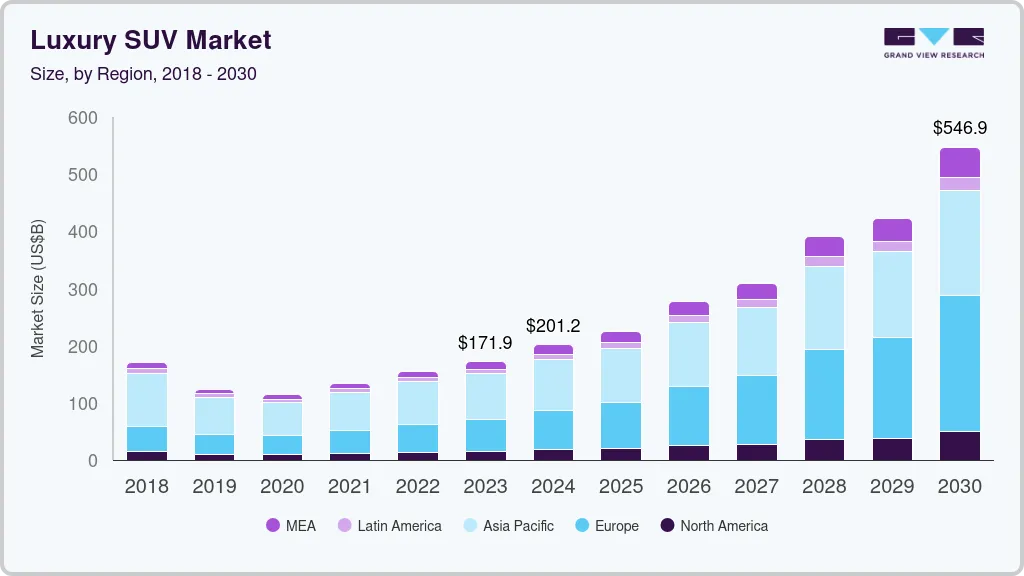Luxury SUV Market Key Players Investing in Future Mobility Trends
The luxury SUV market is set for rapid expansion, fueled by innovations in safety, electrification, and connectivity, alongside growing consumer demand for customization and premium experiences.
The global luxury SUV market was valued at USD 171.88 billion in 2023 and is projected to reach USD 546.91 billion by 2030, expanding at a CAGR of 18.1% between 2024 and 2030. This growth is driven by the integration of cutting-edge technologies, enhanced comfort, and superior performance standards.
Luxury SUVs have emerged as a top choice among consumers seeking a blend of functionality and high-end features. Growing environmental awareness has also led to a notable surge in the development and adoption of electric and hybrid luxury SUVs.

These vehicles are at the leading edge of automotive innovation, incorporating features such as advanced driver assistance systems (ADAS), autonomous driving, and next-generation infotainment solutions. The increasing emphasis on safety has further bolstered demand. For example, a report from the National Highway Traffic Safety Administration (NHTSA) highlighted that ADAS-equipped SUVs have reduced accident rates by 23%, underscoring their impact on road safety.
Personalization is another key trend shaping the market. Consumers are increasingly seeking tailored experiences, and automakers are responding with bespoke options, particularly in affluent regions such as the U.S. and Europe, where individualism drives premium vehicle customization. Connectivity is also a core differentiator, with high-tech features like large touchscreens, voice-activated controls, and seamless smartphone integration becoming standard. The European Commission notes that 5G integration is significantly enhancing connectivity across luxury SUV models.
Key Market Insights:
- Asia Pacific led the market in 2023, contributing 46.18% of global revenue.
- Mid-size SUVs held the largest share by vehicle type in 2023, at 44.29%.
- Internal Combustion Engine (ICE) vehicles dominated by propulsion type in 2023.
Order a free sample PDF**** of the Luxury SUV Market Intelligence Study, published by Grand View Research.
Market Size & Forecast:
- 2023 Market Size: USD 171.88 Billion
- 2030 Projected Market Size: USD 546.91 Billion
- CAGR (2024–2030): 18.1%
- Largest Regional Market (2023): Asia Pacific
Key Companies & Market Share Insights:
Leading players in the luxury SUV space include AB Volvo, Tata Motors Limited, Volkswagen Group, Mercedes-Benz Group AG, Isuzu Motors Ltd., Aston Martin Holdings UK Ltd, Toyota Motor Corporation, Bayerische Motoren Werke AG, Nissan Motor Corporation, and General Motors. These companies are pursuing strategic initiatives like product innovations, partnerships, geographical expansions, and M&A to stay competitive.
Notable Developments:
- June 2024: Volvo Car Corporation began production of the EX90, a fully electric SUV, at its Charleston, South Carolina facility, with a production capacity of 150,000 units annually.
- May 2024: Cadillac unveiled the OPTIQ, a luxury electric SUV featuring dual-motor AWD, 300-mile range, DC fast charging, and advanced sensor technologies. It will launch in 2025.
- April 2023: Lexus, part of Toyota Motor Corporation, launched the Lexus RX, a hybrid electric luxury SUV in India. It features a 2.5-liter inline-four engine, self-charging electric motor, and advanced safety and infotainment systems based on the Tazuna cockpit concept.
Key Players:
- AB Volvo
- Tata Motors Limited
- Volkswagen Group
- Mercedes-Benz Group AG
- Isuzu Motors Ltd.
- Aston Martin Holdings UK Ltd
- Toyota Motor Corporation
- Bayerische Motoren Werke AG
- Nissan Motor Corporation
- General Motors
Explore Horizon Databook – the most comprehensive market intelligence platform by Grand View Research.
Conclusion:
The luxury SUV market is set for rapid expansion, fueled by innovations in safety, electrification, and connectivity, alongside growing consumer demand for customization and premium experiences.